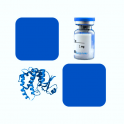
- Remove this product from my favorite's list.
- Add this product to my list of favorites.
Products
Viewed products
Newsletter
 |  |  |  |  |  |

Background
Programmed cell death 1 ligand 1 (PDL1) is also known as B7-H, B7H1, MGC142294, MGC142296, PD-L1, PDCD1L1 and PDCD1LG1,which is a member of the growing B7 family of immune molecules and is involved in the regulation of cellular and humoral immune responses.PDL1 is a cell surface immunoglobulin superfamily with two Ig-like domains within the extracellular region and a short cytoplasmic domain. This protein is broadly expressed in the majority of peripheral tissues as well as hematopoietic cells. Interaction between PDL1 and its receptors belonging to the CD28 family of molecules provide both stimulatory and inhibitory signals in regulating T cell activation and tolerance. PDL1 may inhibit ongoing T-cell responses by inducing apoptosis and arresting cell-cycle progression.
Source
Recombinant Biotinylated Human PD-L1 (19-134), His,Avitag (PDL-H82E4) is expressed from human 293 cells (HEK293). It contains AA Phe 19 - Tyr 134 (Accession # Q9NZQ7-1).
Predicted N-terminus: Phe 19
Molecular Characterization
This protein carries a polyhistidine tag at the C-terminus, followed by an Avi tag (Avitag™).
The protein has a calculated MW of 16.9 kDa. The protein migrates as 19 kDa and 21 kDa under reducing (R) condition (SDS-PAGE) due to glycosylation.
Application
PDL-H82E4 works best for experiments that test the binding between PD-L1 and candidate antibodies, such as biopanning and other relevant assays.
This product is NOT suitable for testing PD1-PDL1 binding. For this type of application, we strongly recommend you to choose PD1-H82F3 as an alternative.
Biotinylation
Biotinylation of this product is performed using Avitag™ technology. Briefly, the single lysine residue in the Avitag is enzymatically labeled with biotin.
Biotin:Protein Ratio
Passed as determined by the HABA assay / binding ELISA.
Endotoxin
Less than 1.0 EU per μg by the LAL method.
Purity
>90% as determined by SDS-PAGE.
Formulation
Lyophilized from 0.22 μm filtered solution in PBS, pH7.4 with trehalose as protectant.
Reconstitution
Please see Certificate of Analysis for specific instructions.
For best performance, we strongly recommend you to follow the reconstitution protocol provided in the CoA.
Storage
For long term storage, the product should be stored at lyophilized state at -20°C or lower.
Please avoid repeated freeze-thaw cycles.
This product is stable after storage at:
-20°C to -70°C for 12 months in lyophilized state;
-70°C for 3 months under sterile conditions after reconstitution.
Bioactivity
Please refer to product data sheet.
(1) "Mapping the single cell spatial immune landscapes of the melanoma microenvironment"
Magrill, Moldoveanu, Gu et al
Clin Exp Metastasis (2024)
(2) "Response to PD-1 inhibitor in SMARCB1‑deficient undifferentiated rectal carcinoma with low TMB, proficient MMR and BRAF V600E mutation: a case report and literature review"
Shen, Pan, Zou
Diagn Pathol (2024) 19 (1), 11
(3) "Repeated peripheral infusions of anti-EGFRvIII CAR T cells in combination with pembrolizumab show no efficacy in glioblastoma: a phase 1 trial"
Bagley, Binder, Lamrani et al
Nat Cancer (2024)
Showing 1-3 of 28045 papers.
Recombinant Human PD-L1/B7-H1 Protein, low endotoxin, Fc Tag, 100µg - 429,00 €
Recombinant Mouse PD-L1 /CD274 /B7-H1 Protein, With C-Fc Tag, 200µg - 364,00 €
Recombinant Human PD-1 / PDCD1 Protein (HPLC-verified), His Tag, 100µg - 461,50 €
Recombinant Cynomolgus PDCD1 /PD1 Protein, Fc Tag (MALS verified), 100µg - 442,00 €
Recombinant Human PDL1 /CD274 / B7-H1 Protein, Twin Strep Tag, 25µg - 351,00 €
Recombinant Biotinylated Human PD-L1 / B7-H1, Fc,Avitag™,His Tag (MALS verified), 25µg - 520,00 €
Follow us